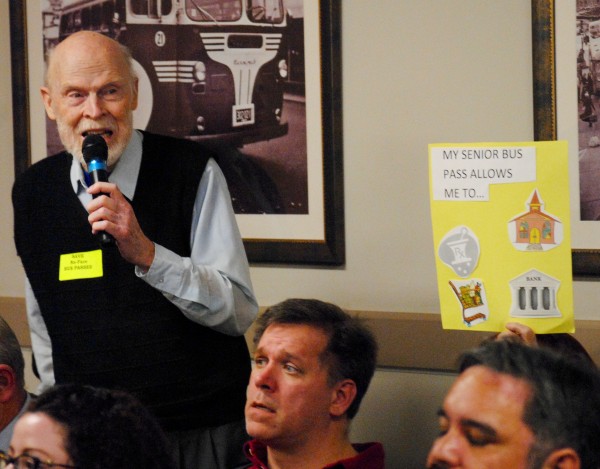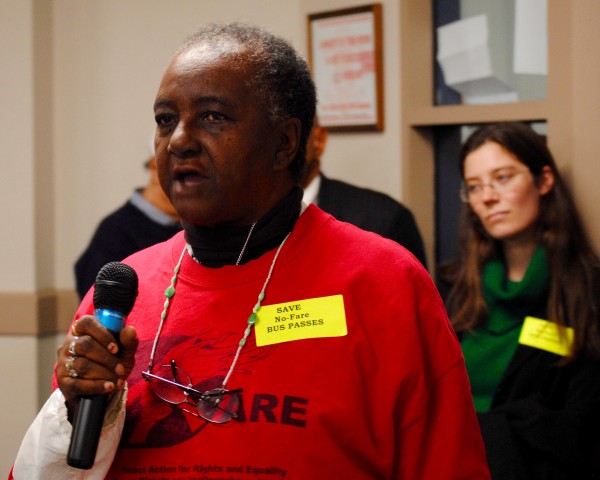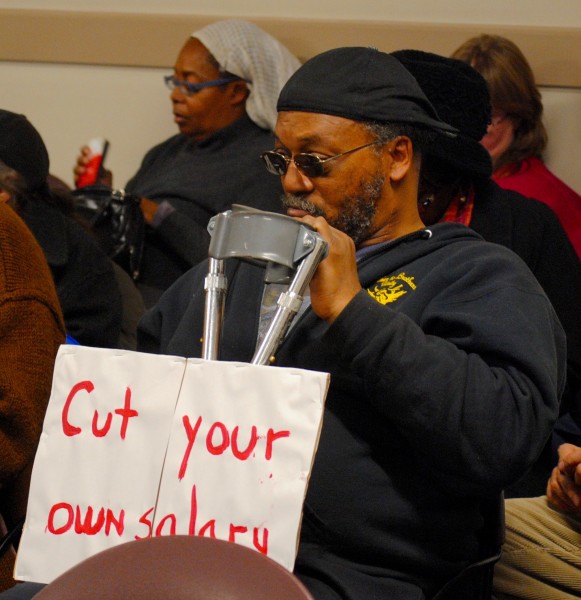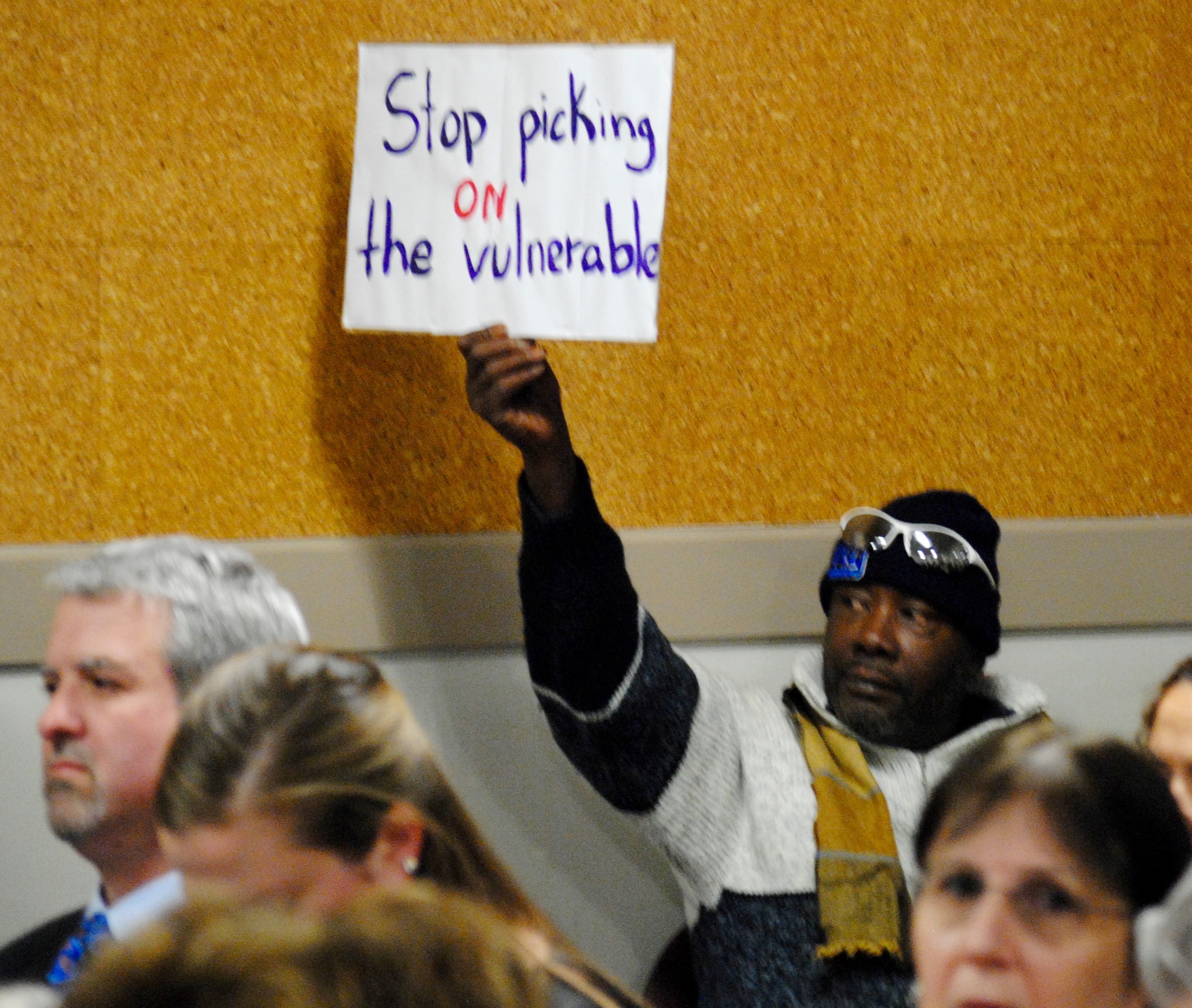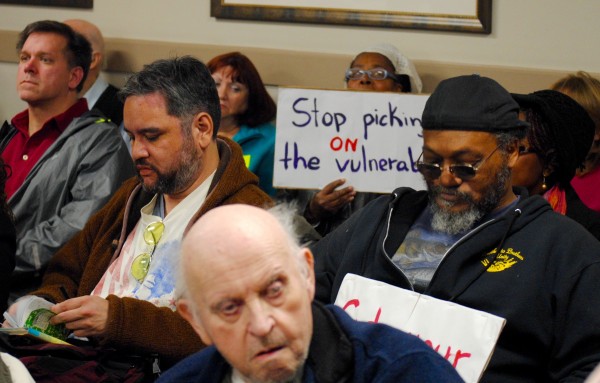 About 100 people turned out to oppose the RIPTA‘s planned fare hikes on the elderly and disabled at yesterday’s board meeting, packing the small conference room and overflowing into the halls. This almost doubles the opposition the plan faced a month ago at the last board meeting.
About 100 people turned out to oppose the RIPTA‘s planned fare hikes on the elderly and disabled at yesterday’s board meeting, packing the small conference room and overflowing into the halls. This almost doubles the opposition the plan faced a month ago at the last board meeting.
This time 29 people spoke out against the fare hikes. Some were speaking out for themselves, as affected riders, others were there to advocate for the people they serve.
“Our constituents literally have no money,” said Lee Ann Byrne, policy director at Rhode Island Coalition for the Homeless. She noted that 53 percent of Rhode Island’s homeless population are disabled.
Willa Truelove, of the State Rehabilitation Council, pointed out that it is “about to be really cold” which will create mobility issues for people who would normally use the bus to travel. These people, says Truelove, “cannot afford to pay another dime.”
But the most contentious moment of the afternoon was during the testimony of William Flynn, executive director of the Senior Agenda Coalition of RI. It was at this moment that a seemingly exasperated Mayor Scott Avedisian, the head of RIPTA’s board, interrupted Flynn to “clarify” the issue at hand.
Flynn was making the point that lack of access to affordable transportation will strand seniors at home, leading to disastrous health outcomes for seniors and greater costs to Medicare. Theses are the certain results of the actions the board takes today, said Flynn. Avedisian interrupted, (at the 1m 10s mark below) insisting that the issue was not up for a vote today, and that the decision has not been made.
Avedisian insisted that today’s vote was, “the beginning of a public hearing process” but as the later discussion made clear, the public hearing process and subsequent vote to raise fares is all but inevitable. There are no plans under consideration that do not include fare increases, and if the board does not increase fares there are no alternative revenue streams to balance their $6 million shortfall.
RIPTA will shortly announce a series of ten public hearings throughout the state to take place in the evening and afternoons. After the hearings RIPTA hopes for a vote sometime in December and for the fare increase to be in place by February.
Reverend Donald Anderson, representing the Interfaith Coalition to Reduce Poverty, asked the board to take a stand against the idea of balancing budgets on the backs of the most vulnerable. While acknowledging the fact that RIPTA’s budgetary woes are entirely due to the General Assembly’s lack of support for RIPTA, he maintained that a vote against beginning the process that will inevitably lead to raising the rates on seniors and the disabled might set a moral example for other boards throughout the state.
Despite Anderson’s plea, the entire board voted to proceed.
Though the fare increase on seniors and disabled riders seems inevitable, as Randall Rose, a member of the RIPTA Riders Alliance pointed out, this outrage can be defeated if enough people raise the issue and fight against it.
This meeting easily doubled the number of people who turned out against the fare increase last time. As awareness of this issue grows and media outside of RI Future start to cover this, opposition will grow as well. Further, we are entering an election year. Members of the General Assembly will begin their bi-annual treks to elderly housing complexes searching for votes. You can be sure that these voters will be wondering why their fixed incomes are being mined o pay for previously free services.
You can also be sure that RI taxpayers will be wondering why RIPTA is being forced to take actions that will result in soaring Medicaid and Medicare costs. As seniors and disabled riders are forced to choose between transportation and medication, or cut down on the essential transportation that keeps them socially engaged and healthy, taxpayers will be footing the bill.
It is far cheaper to provide free transportation than it is to provide round the clock nursing care.
Below is the testimony of all twenty-nine people to speak against the fare hikes.
